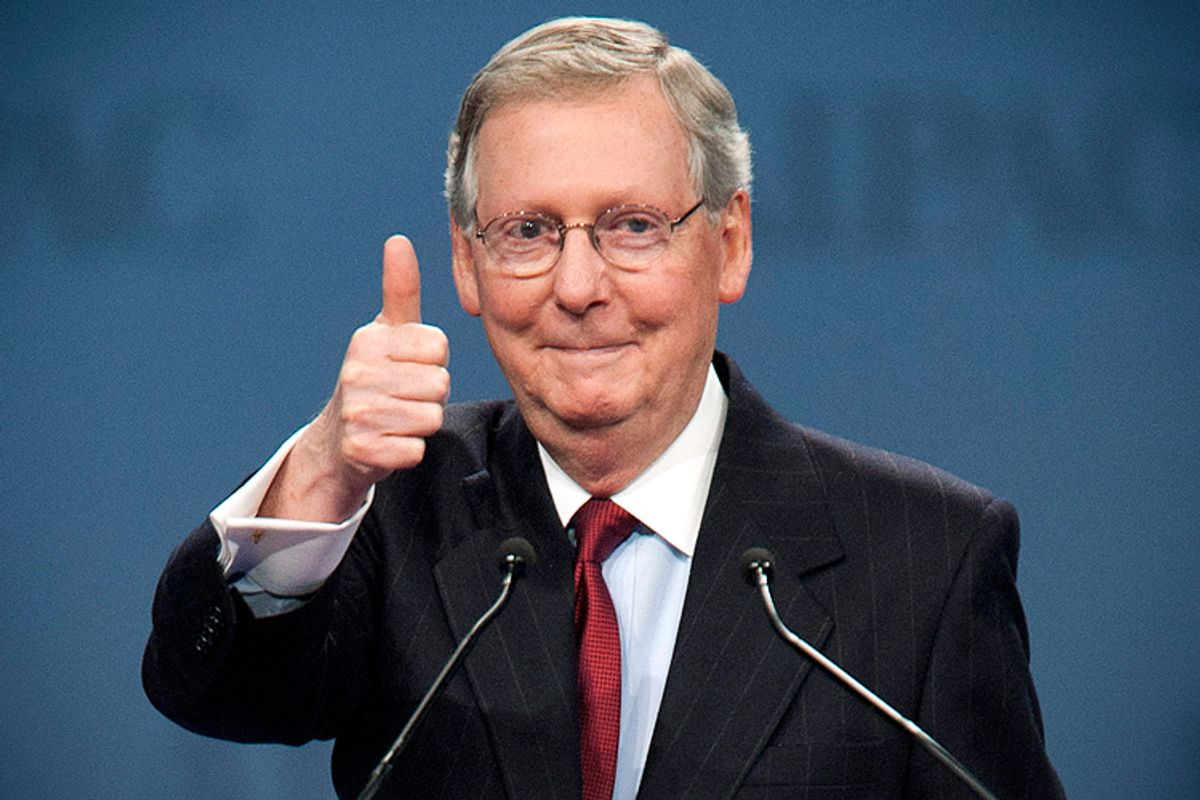The narrative this week will be scored in favor of the "Establishment," which makes the score 2-1 "Establishment," if you, like us, have no life and are keeping score of this bogus weekly narrative game. As we wrote yesterday, the personification of the establishment himself, Addison Mitchell "Mitch" McConnell, is expected to cruise past cockfight-loving Matt Bevin in Kentucky's GOP Senate primary, because Matt Bevin sucks at politics and Mitch McConnell is pretty good at it. And in Georgia's decidedly more enjoyable GOP Senate primary, the top three candidates are said not to come from the "Tea Party," because they are not as likely to make traumatic gaffes as also-ran Reps. Paul Broun and Phil Gingrey are.
And since Georgia's primary will almost certainly be extended for a runoff, tomorrow is truly Mitch McConnell's day. How did he do it? Surely you know the two-part answer here, reader: by running to the right and having lots of money. For all the touting of Matt Bevin as a key recipient of cash from outside "Tea Party" groups like the Senate Conservatives Fund, he raised $3.7 million this cycle. McConnell spent $12 million, and spent it well, showcasing all the oppo-research holes in Bevin's story.
And what's so different about the two -- the insider Washington establishment hack and the Tea Party grass-roots outsider -- policy-wise? Basically nothing, of course. The Louisville Courier-Journal writes:
But according to their responses to a Courier-Journal questionnaire, the Senate's minority leader and his main challenger in the Republic primary agree on a range of issues.
Both oppose a minimum-wage hike, expanded background checks for gun buyers and more limitations on political contributions.
Both say they oppose legalizing gay marriage and cutting the military budget. Both want to repeal the Affordable Care Act and reform the federal tax code. And both refuse to say if climate change is caused by man.
"About the only thing they disagree on," the Courier-Journal writes, "is whether the United States should scale back its role overseas." And all that Matt Bevin really suggests is that the "foreign aid" budget should be trimmed. This, like opposition to hikes in the debt ceiling, is a popular cry among Tea Party faithful, because both terms sound bad but are misunderstood. "Raising the debt ceiling" doesn't mean additional new spending programs, and "foreign aid" is a euphemism for diplomatic maintenance, for paying countries a relatively small amount to purchase weaponry from American defense contractors and not be our overt enemies.
Bevin has also tried to make Obamacare an issue, "[accusing] McConnell of not being forceful enough in his opposition to the Affordable Care Act, known as Obamacare. McConnell has said he wants to repeal it 'root and branch' but has acknowledged that is impossible while Barack Obama is president." Here's a textbook example of how the Establishment vs. Tea Party debate mostly focuses around tactics instead of beliefs. And Bevin's argument surely has less teeth among GOP primary voters than it did even a year ago: the government shutdown over Obamacare showed conclusively the possibility (zero) of repealing the law during the Obama administration.
Mitch McConnell shut him down. What a guy. Barring some Bevin miracle tonight, McConnell will next face Democrat Alison Lundergan Grimes in the general election. Polls show McConnell and Grimes essentially tied right now. I don't know if Democrats should get their hopes up too much. McConnell will likely get a bump once he's dispatched Bevin and the Republican Party unites around him. And as this primary has shown, he runs a sharp campaign, and he's not afraid to remind Kentucky voters of all the money that he, as the Senate's top-ranking Republican, brings home for the state.
Were McConnell to win tomorrow and in November, and Republicans to win just enough of the other competitive Senate races across the country, he will be the new Senate majority leader. His life's goal! But wait a second ... what's that? Is that the sound of other candidates running so far to the right to prove their bona fides with the grass roots that they're pledging not to support McConnell?
Would you support Mitch McConnell as GOP leader, whether in the minority or majority?
The Kentuckian was not warmly embraced.
Businessman David Perdue: “My answer is no.”
Former Secretary of State Karen Handel: “Absolutely not. We need new leadership with new people there.”
This would be the ultimate comeuppance for McConnell in his play to thwart Tea Party challengers by cynically adopting all of their positions and demeanor. He and the "Establishment" might get their candidates, but they'll have no room left for McConnell. And then we would reach the end stage of this experiment in pandering, wherein Mitch McConnell would only be able to save his leadership position by denouncing Mitch McConnell.

Shares